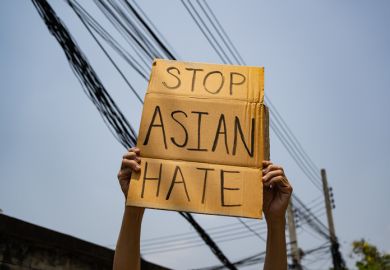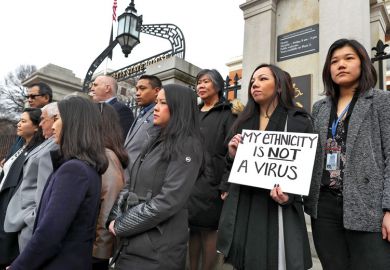Chinese students are much more likely to report discrimination at UK universities than students of other nationalities, according to the findings of a large survey.
The International Student Barometer (ISB), which is produced by Etio (formerly Tribal Education Services), polled 122,975 international students at 155 institutions across 24 countries for its 2024 edition.
The results showed that international students at UK institutions have experienced levels of discrimination similar to that of the global ISB average over the past three years – 22 per cent reported this – and feel just as welcome and have a greater sense of belonging.
However, researchers found “stark variations” between different nationalities, with students from East and South-east Asian (ESEA) backgrounds most likely to be affected.
Students from China were the most frequently victimised, with 41 per cent reporting having faced discrimination because of their race or ethnicity – up from 35 per cent in the 2022 study.
Campus resource: Questions to ask yourself about your role in institutional racism
This is double the proportion of Indian students (20 per cent) who reported discrimination, and above the rates reported by Nigerians (18 per cent), Pakistanis (23 per cent) and Americans (12 per cent).
Sam Camden, client consultant for performance benchmarking at Etio, said one potential hypothesis was that the relatively high prevalence of discrimination against ESEA students in the UK was a “potential hangover from the Covid-19 pandemic”.
Mr Camden said hate crimes against Asians rose amid the frequent “apportioning of blame for the virus’ origination on China”, but such attitudes had softened as the pandemic receded from people’s immediate memory and should continue to wane.
However, given that students of all ages and from all ESEA backgrounds have continued to face problems, “something more pervasive” may be occurring, he suggested.
The ISB report did find some good news for the sector – the frequency of discrimination faced does not appear to correlate with a significantly diminished sense of belonging, or feeling of being welcome, among students from ESEA backgrounds.
Mr Camden said there was “clearly more work to be done” by the UK sector to reduce discrimination against international students, particularly those from Asia.
“The frequency of discrimination faced by this group of students was significantly higher than the UK average, and consistent across all years of study, meaning this cannot simply be dismissed as a pandemic-related aberration,” he added.
“This is not to create a hierarchy of discrimination when discussing inclusivity policy, but to highlight the fact that the experience of international students cannot be homogenised.”
Register to continue
Why register?
- Registration is free and only takes a moment
- Once registered, you can read 3 articles a month
- Sign up for our newsletter
Subscribe
Or subscribe for unlimited access to:
- Unlimited access to news, views, insights & reviews
- Digital editions
- Digital access to THE’s university and college rankings analysis
Already registered or a current subscriber? Login








